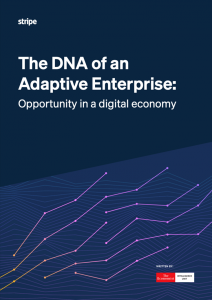 Over the past two years, enterprise leaders around the world have had to respond to disruption, unpredictability, and unprecedented challenges. The way the world interacts and transacts has changed, and across millions of businesses using Stripe, we’ve noticed that the capacity for businesses to adapt has been a major determinant of resilience and growth.
Over the past two years, enterprise leaders around the world have had to respond to disruption, unpredictability, and unprecedented challenges. The way the world interacts and transacts has changed, and across millions of businesses using Stripe, we’ve noticed that the capacity for businesses to adapt has been a major determinant of resilience and growth.
An adaptive business initiates change; an agile business reacts to it. The next generation of industry leaders will be companies that anticipate and take action to capture emergent opportunities, using their flexibility as a competitive advantage. They execute on strategies to find new revenue streams, pursue global expansion, and partner to scale faster. According to a recent study from Forrester, adaptive businesses grow at more than three times the industry average.
Stripe worked with The Economist Impact (formerly known as The Economist Intelligence Unit) on a research study that takes a deeper look into the core characteristics that make enterprises adaptive, the strategies leaders are pursuing as online commerce expands, and how the ability to navigate change is an enduring competitive advantage.
Report overview
The analysis in the report is based on a survey of 600 C-level executives, and around a third of the respondents (34%) are based in Europe, with another third (33%) in North America, and the balance in Asia-Pacific. Their companies are distributed across a wide range of industries, with the largest representation from the financial services (15%), technology (15%) and retail (11%) sectors. Just over half (53%) of the respondents work in companies earning annual revenue of over US$500m, with the rest earning between US$100m and US$500m. Most of the companies represented (83%) are no older than 20 years, and 44% have existed for fewer than ten years.
Executive summary
The Covid-19 pandemic brought about profound change, affecting long- standing consumer behaviours and preferences, and in some cases permanently changing competitive landscapes. Businesses had to make consequential decisions in short order—rapidly modifying business models, accelerating digital transformation, seeking out new revenue streams, moving or re-thinking supply chains, entering new product or geographic markets, and improving online customer experiences.
The past two years have created an inflection point for enterprises—one that is likely to define business success for the next decade. Risks to business are considerable, yet organizations that are able to successfully navigate disruption while positioning themselves for growth can be a competitive advantage in today’s global economy. The findings in this report detail characteristics of an adaptive enterprise.
Key findings from the study
Adaptability is decisive. Businesses able to maintain or grow revenue under the difficult conditions of the pandemic appear to have made proactive choices in adapting to widespread change. When asked about chief factors enabling success, CxOs point to their firms’ ability to change or adopt new business models, serve customers online, and scale in short order to shifts in customer behavior and demand. Companies suffering revenue declines, by contrast, highlighted struggles with some of these same areas.
Going for growth. The pandemic has not slowed, but instead seemingly accelerated businesses’ pursuit of growth or new revenue streams. Survey respondents indicate a strong intention to boost investment in technology and show little support for cost-cutting. Rather than contract their businesses, a majority of CxO respondents—80%—believe global expansion is central to their business viability. Over half—52%—plan to increase the number of countries they trade in over the next year. Only 13% said they would decrease.
Digital is integral. The flight of consumers to digital channels was dramatic in 2020, and CxOs in the survey expect the consumer trends that accelerated during the crisis to gain additional momentum. Among the surveyed companies, 28% say half or more of their company sales came via online channels before the pandemic, 46% indicate the same was true during the pandemic (as at October 2020), while 54% anticipated half of their revenue to come from online channels by the end of 2021. A majority—82%—believe that their customer’s shift to online purchasing during the crisis will continue, even after the pandemic is over.
Anticipation is key. Far from all companies were ready for a digital acceleration: 69% of CxOs say their firms under-invested in online strategies before the pandemic. A majority—53%—say they now plan to boost investment in digital transformation over the next 12 months, aiming to improve processes or operations, innovation and customer experiences. The maintained or increasing digital budgets imply a CxO outlook that it’s never too late to adapt.
Check out the full version of the report to gain more insights.
This is a sponsored post by Stripe, Gold sponsors of FinovateEurope 2022. Stripe is a financial infrastructure platform for businesses. Millions of companies—including financial organisations like Hargreaves Lansdown, Klarna, and AJ Bell—use Stripe to accept payments, grow their revenue, and accelerate new business opportunities. Headquartered in San Francisco and Dublin, the company aims to increase the GDP of the internet. Check out Stripe’s website to learn more, and contact sales when you’re ready to have a conversation.
